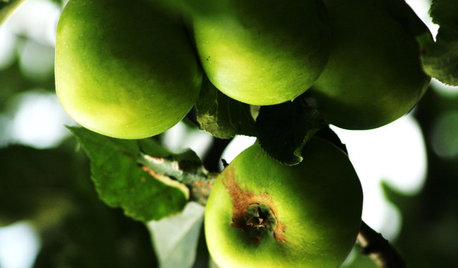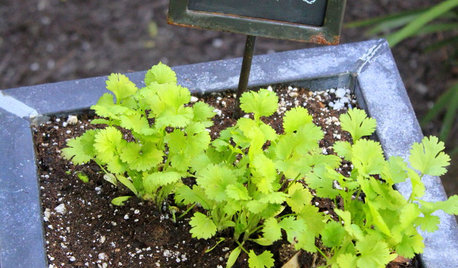should I add fertilizer?
berryman135678
11 years ago
Related Stories

GARDENING GUIDESGet on a Composting Kick (Hello, Free Fertilizer!)
Quit shelling out for pricey substitutes that aren’t even as good. Here’s how to give your soil the best while lightening your trash load
Full Story
EDIBLE GARDENSHow to Add an Apple Tree to Your Edible Garden
Readily available, beautiful and fragrant, apple trees offer four-season interest along with crisp, juicy fruit
Full Story
GARDENING GUIDES5 Prairie Wildflowers That Can Heal Your Soil
Get free, organic soil fertilizer with nitrogen-pumping plants that draw pollinators too
Full Story
HOUSEPLANTSHow to Add a Living Wall
Learn how to choose systems and plants, and what it will cost to bring a bit of the outdoors in or green up a garden wall
Full Story
FLOWERSOrchids 101: Cymbidiums Add Beauty Indoors and Out
Their large, long-lasting flowers give them a place of honor in homes and gardens
Full Story
GARDENING AND LANDSCAPINGOld School Green Design: Add Texture With Grass
Ornamental grasses capture the breeze and ripple like water in the landscape
Full Story
GARDENING GUIDESGot a Hot, Humid Landscape? Add Tropical Flair With Air Plants
Turn tree trunks and walls into lush canvases with plants adapted to the canopies of the rainforest
Full Story
GARDENING GUIDESHerb Garden Essentials: Versatile Cilantro Adds Flavor to Herb Gardens
Love it or hate it, this cool-season herb contributes its unique flavor to any number or the world’s cuisines
Full Story
GARDENING GUIDESPacific Northwest Gardener: What to Do in September
Put in cool-weather veggies, fertilize your lawn and tidy the garden this month before chilly weather arrives
Full Story
GARDENING GUIDESHow to Keep Your Citrus Trees Well Fed and Healthy
Ripe for some citrus fertilizer know-how? This mini guide will help your lemon, orange and grapefruit trees flourish
Full Story





Lloyd
ceth_k
Related Professionals
Hershey Landscape Architects & Landscape Designers · Sand Springs Landscape Architects & Landscape Designers · Buford Landscape Contractors · Federal Way Landscape Contractors · Fort Wayne Landscape Contractors · Franklin Landscape Contractors · San Carlos Park Landscape Contractors · Braintree Decks, Patios & Outdoor Enclosures · Gaithersburg Decks, Patios & Outdoor Enclosures · Grain Valley Decks, Patios & Outdoor Enclosures · Green Bay Decks, Patios & Outdoor Enclosures · Jackson Decks, Patios & Outdoor Enclosures · Lake Arrowhead Decks, Patios & Outdoor Enclosures · Manchester Decks, Patios & Outdoor Enclosures · Midwest City Decks, Patios & Outdoor EnclosuresKimmsr
berryman135678Original Author
ericwi
wayne_5 zone 6a Central Indiana
Kimmsr
toxcrusadr
fairfield8619
vermontkingdom
elisa_z5
toxcrusadr
sunnyside1
ladyrose65
Kimmsr